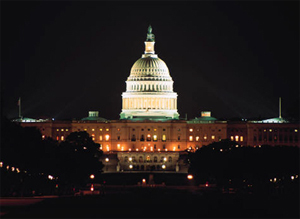[author: Kevin E. Noonan]
 Lurking in H.R. 6621, a bill entitled "To correct and improve certain provisions of the Leahy-Smith America Invents Act and title 35, United States Code" and introduced on November 30th by Rep. Lamar Smith (R-TX) is a provision that would substantively affect (and effectively eliminate) patent rights for the ~200 pending U.S. patent applications having a filing date prior to June 7, 1995 (when legislation enabling the provisions to the Uruguay Rounds of the General Agreement on Tariffs and Trade (GATT) were enacted that changed the term of U.S. patents from 17 years from grant to 20 years from earliest priority/filing date). That provision reads as follows:
Lurking in H.R. 6621, a bill entitled "To correct and improve certain provisions of the Leahy-Smith America Invents Act and title 35, United States Code" and introduced on November 30th by Rep. Lamar Smith (R-TX) is a provision that would substantively affect (and effectively eliminate) patent rights for the ~200 pending U.S. patent applications having a filing date prior to June 7, 1995 (when legislation enabling the provisions to the Uruguay Rounds of the General Agreement on Tariffs and Trade (GATT) were enacted that changed the term of U.S. patents from 17 years from grant to 20 years from earliest priority/filing date). That provision reads as follows:
(m) Effective Date of Uruguay Round Agreements Act –
(1) CERTAIN PATENT APPLICATIONS- Notwithstanding section 534(b)(1) of the Uruguay Round Agreements Act (35 U.S.C. 154 note), section 154(a) of title 35, United States Code, as amended by section 532 of the Uruguay Round Agreements Act (Public Law 103-465; 108 Stat. 4809), shall apply, and section 154(c)(1) of title 35, United States Code, shall not apply, to any application that is –
(A) filed before the date that is 6 months after the date of the enactment of the Uruguay Round Agreements Act; and
(B) pending on a date that is 1 year or more after the date of the enactment of this Act.
(2) EFFECTIVE DATE – This subsection shall take effect on the date that is 1 year after the date of the enactment of this Act and shall apply to any original plant or utility patent application that is pending on or after that effective date.
Hiding in this verbiage is the requirement that the 20-year term (35 U.S.C. § 154(a)) shall be applied to pre-GATT filed patents provided that they are pending "1 year or more after enactment of" the bill. This means, in effect, that unless the U.S. Patent and Trademark Office has granted these patents within this time the term of any patent that grants on such a pending application would be 20 years from earliest filing date (which would eliminate term for any pending application having an effective filing date of ~1994, i.e., the vast majority of the pending pre-GATT cases).
 The motivation for this provision in the bill is unclear. These cases are somewhat of an embarrassment to the Office, of course, insofar as their existence can be used to insinuate that the Office has been tardy in examining them. But this is mostly not the case: the majority of these applications have been involved in protracted interferences, appeals, or had examination suspended for Office consideration of third party interferences that would influence the patentability of pending claims. What is decidedly the case is that the delay in prosecuting these applications has not been the result of applicant delay, strategic or otherwise. This is because the implementing legislation and PTO rules were drawn to prevent such shenanigans. For example, filing a continuation or Request for Continued Examination in these applications strips such applications of their pre-GATT status (and would result in the same loss-of-rights that the present bill would cause). Transitional procedures adopted by the Office permitted an applicant to petition for withdrawal of the finality of a rejection but this opportunity could only be used twice; thereafter, the only recourse for pre-GATT applications was filing an appeal. Thus, the Office carefully crafted its rules to minimize long pendencies for pre-GATT cases, a policy that undoubtedly is responsible for limiting the number of existing cases to 200.
The motivation for this provision in the bill is unclear. These cases are somewhat of an embarrassment to the Office, of course, insofar as their existence can be used to insinuate that the Office has been tardy in examining them. But this is mostly not the case: the majority of these applications have been involved in protracted interferences, appeals, or had examination suspended for Office consideration of third party interferences that would influence the patentability of pending claims. What is decidedly the case is that the delay in prosecuting these applications has not been the result of applicant delay, strategic or otherwise. This is because the implementing legislation and PTO rules were drawn to prevent such shenanigans. For example, filing a continuation or Request for Continued Examination in these applications strips such applications of their pre-GATT status (and would result in the same loss-of-rights that the present bill would cause). Transitional procedures adopted by the Office permitted an applicant to petition for withdrawal of the finality of a rejection but this opportunity could only be used twice; thereafter, the only recourse for pre-GATT applications was filing an appeal. Thus, the Office carefully crafted its rules to minimize long pendencies for pre-GATT cases, a policy that undoubtedly is responsible for limiting the number of existing cases to 200.
In view of the lack of culpability of patent applicants for the situation (and keeping in mind how skewed expectations have become since the change to the 20-year term), it applies particular prejudice on applicants to have their patent rights be completely dependent on the PTO completing prosecution and granting a patent within one year of enactment of the bill. Besides the obvious logistical difficulties this scheme would occasion, it also raises the likelihood that citizens' property rights would evaporate by agency inaction, an outcome that fails Civics 101.
There are alternatives if Rep. Smith or the Office are serious about bringing prosecution of these cases to conclusion. For example, the Office could establish a program, analogous to the "Fast Track" program for patent prosecution, that would be dedicated to these applications and having them granted, abandoned, or appealed within some reasonable timeframe. There are undoubtedly other ideas that could be explored. What should not be enacted is a bill passed on the "fast track" in a lame duck Congress and touted as being merely technical in nature. Although the bill is rumored to be slated to be passed without comment or amendment in the House, concerned citizens or their interest groups should contact their Senator to put a hold on this legislation until it can be considered more deliberately in the next Congress.
Hat tip to Hal Wegner for recognizing this provision of the bill.